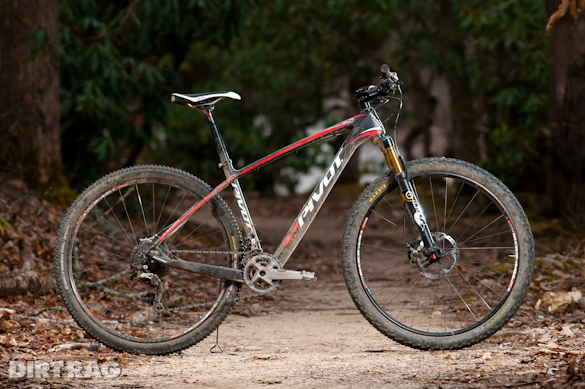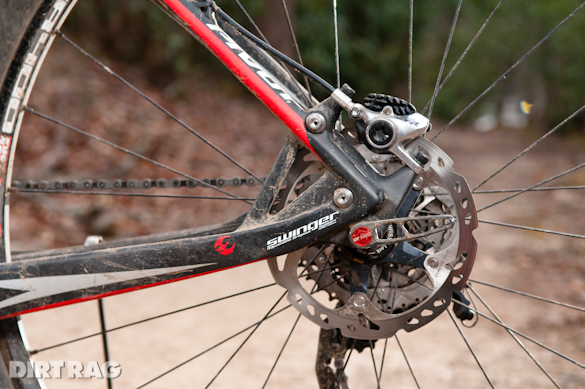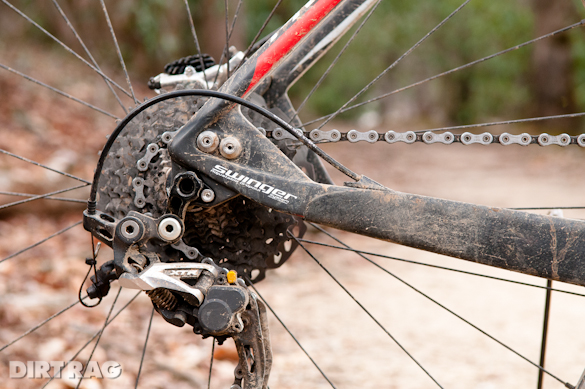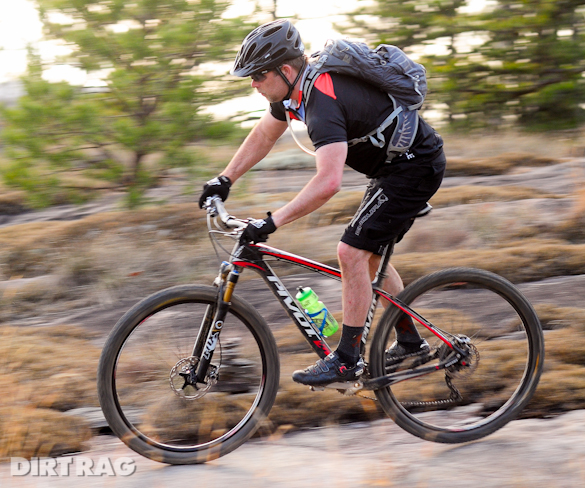Review: Pivot LES carbon hardtail 29er
Originally posted on April 9, 2014 at 9:01 am
Since 2006, Pivot Cycleshas been well known for its full suspension creations, and we’ve had several successfully run through the Dirt Rag testing process. A few have even made it into the personal stables of a couple Rag staffers. So, it was of interest when Pivot Cycles designer/founder Chris Cocalis decided to throw his hat into the “pivotless” ring with the manufacturer’s first hardtail 29er, the LES, which aims to be a high performance race bike with a smooth ride.

On paper, the LES appealed to me because of Pivot’s choice to create a lightweight hardtail with a fairly slack 69.5-degree head tube angle, and the ability to swap between a geared or singlespeed drivetrain with its $150 Swinger dropout kit. The kit includes cold-forged aluminum dropouts, a front derailleur plate and caps to cover the internal gear cable locations. The chain tension adjustment bolts are indexed to ensure even tensioning and wheel alignment. Each dropout is solidly attached to the frame using two M8 bolts. This is a well-engineered system, clearly not just an afterthought. The singlespeed dropouts are designed for a 135mm QR (or bolt-on) rear wheel while the standard, geared dropouts are carbon fiber and accept a 142×12 thru-axle.

Other items of note: the internal cable routing is serviceable through a plate under the bottom bracket, there’s a 92mm press fit bottom bracket allowing for a wider down tube and bottom bracket/chainstay junction, a direct mount front derailleur and clearance for a 2.5 inch rear tire. With a complete Shimano XTR 2×10 drivetrain, Kashima coated Fox Float 29 100mm CTD fork, Pivot 700mm carbon handlebar and DT Swiss wheels, the LES weighed in at a scant 22.5 pounds, sans pedals.

I’ve always thought if I were forced into riding one bike, and one bike only for the remainder of my pedaling years, it would have to be a hardtail 29er. Of course, there are some things that it couldn’t do, and some situations where I would rather not take it, but for 90% of the time it would do well enough to get by and most of the time it would excel. However, up until the last few years, most hardtail 29ers utilized steep head tube angles. Recently, we’ve tested some pretty great 29er trail hardtails, such as the Kona Honzo and Diamondback Mason, but their slack angles and increased front end travel appeal to the more seasoned, aggressive trail rider. A common feature on all of these bikes is a short rear end, which allows their slacker angles to perform well while riding through tight sections of trail.

The Pivot LES isn’t trying to be a bike you’d float through rock-strewn singletrack, or huck off a ledge. It’s a bike that gives the XC racer increased stability and smoothness when hitting more technical features. And lest you forget who this bike is marketed towards, one glance down at the skinny, stock 2.2 Kenda Slant Six tires will remind you. I swapped out the front for a meatier 2.4 Ardent during my test period and found my frequent forays into sketch a bit more manageable. Most noticeable on the LES was its prowess when tackling moderately bermed trails that had a little bit of chatter to them. The carbon frame filtered out noise from the smallest rocks, but at the same time didn’t suffer from too much flex when whipping through berms or pedaling through swoopy, fast singletrack. There was a nice balance of stiffness and comfort.

The head tube angle never made the front wheel feel floppy when grinding up tight switchbacks, nor did it feel too twitchy when tackling technical descents. The 100mm Fox fork occasionally left me wanting more travel when picking lines through the more rocky sections of trail I encountered, but it fit the bike’s intended use well. A simple flick of the Float 29’s CTD lever to the firm “climb” setting was welcomed on extended fire road climbs.
From the very first ride, the combination of the LES’ light weight and slack angles made this one of those bikes I immediately felt at home on. The beefy down tube/chainstay/bottom bracket junction felt stiff while pedaling—adding to the feeling that all my power was getting through to the pedals as I cranked away. Its low, 12.1-inch bottom bracket kept me stuck to the ground while pushing hard into berms and tight switchbacks. Compared to other XC race bikes I’ve ridden, this geometry allowed for more maneuverability when navigating log piles, rocks and the like.

The LES might just be the perfect bike for the racer looking for a more stable style of XC 29er that’s well-suited to more technical courses. For those who want a less costly option, there are several other builds starting at $3,800, or you can pick up just the frame for $2,000.
Vital Stats
- Country of Origin: Taiwan
- Price: $6,700 (as tested)
- Weight: 22.5 pounds
- Sizes Available: S, M (tested), L, XL
